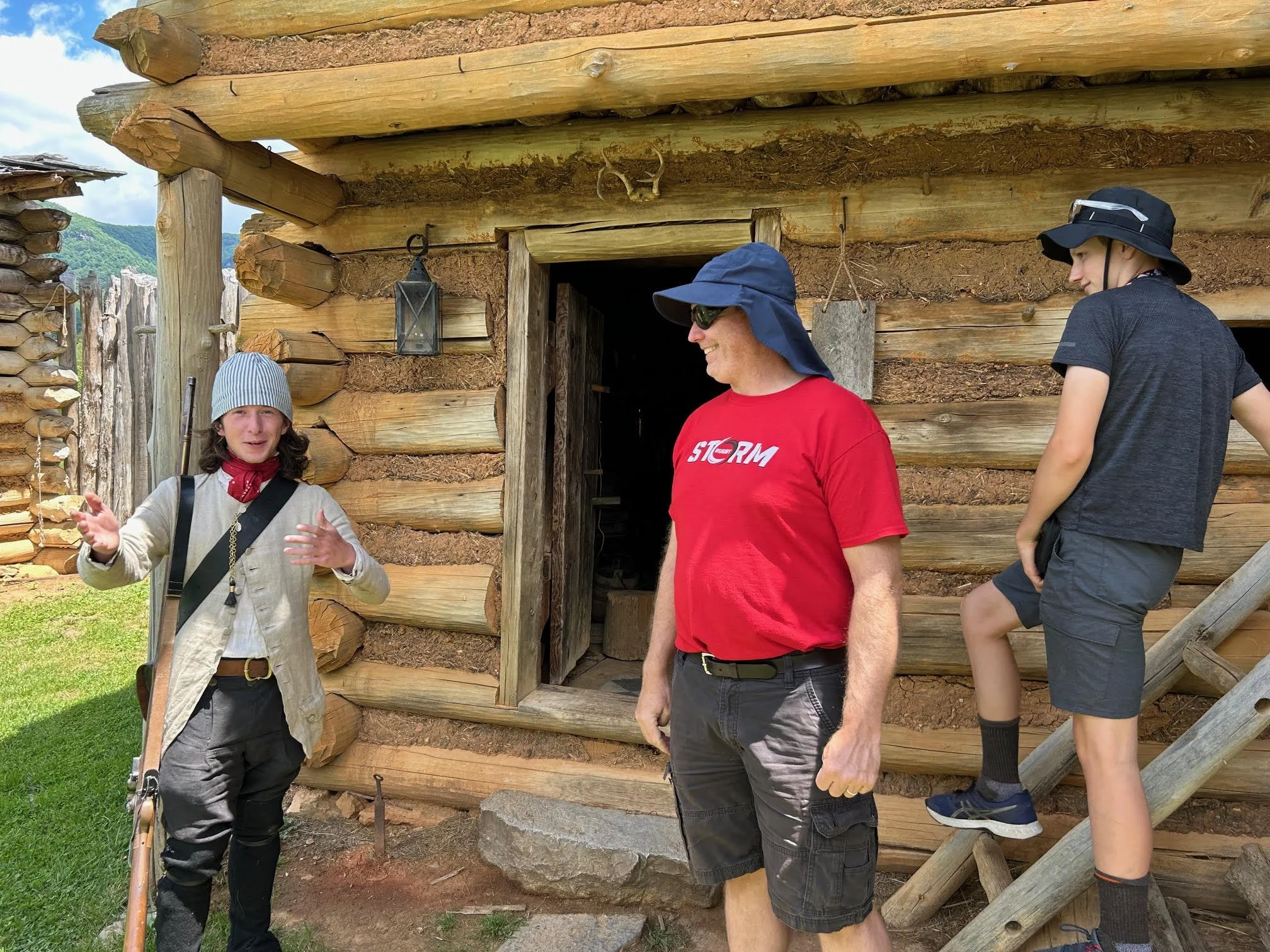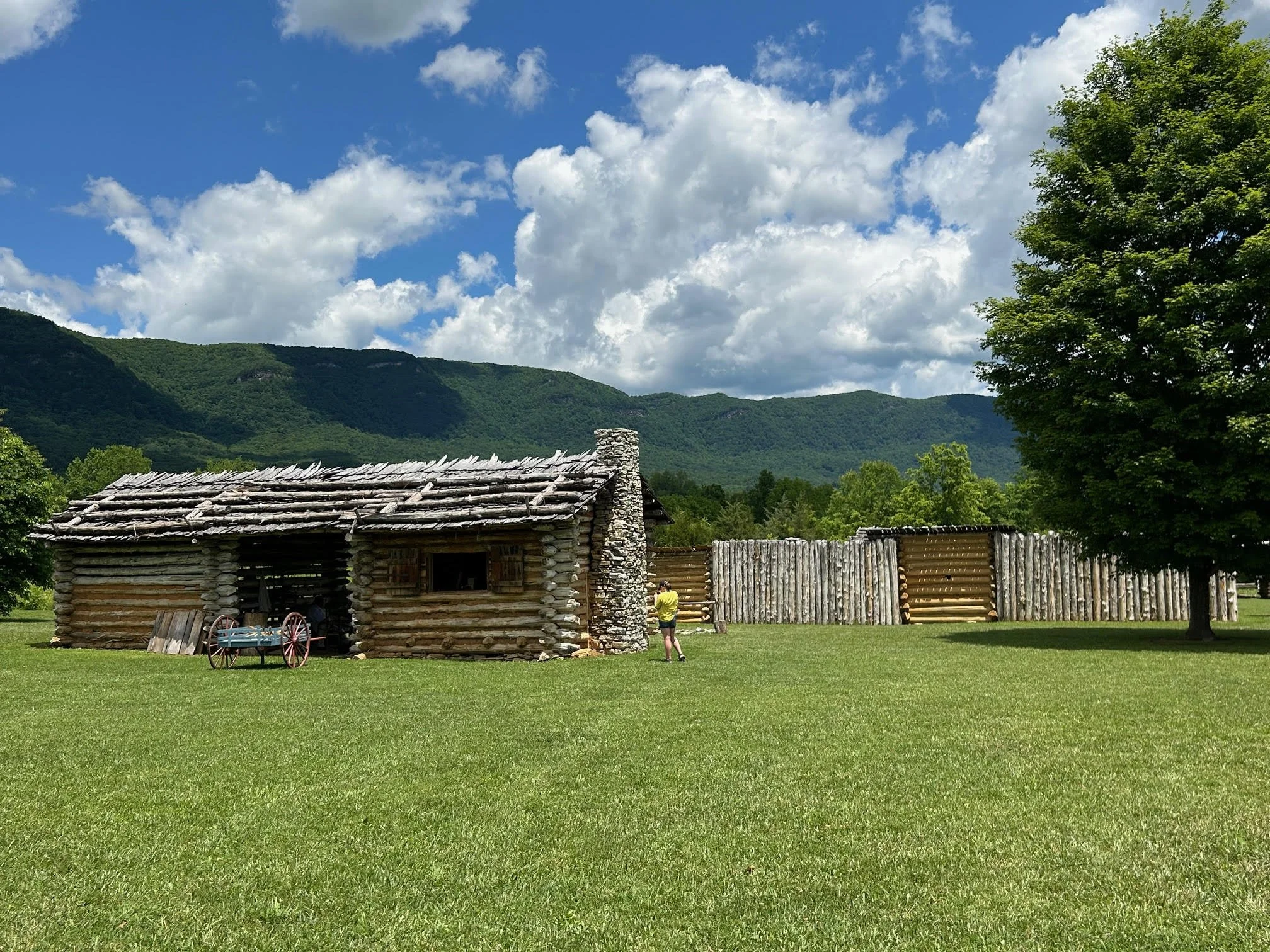Wilderness Road: Martins Station State Park Honors General Joseph Martin
Pictured in pink in the middle is Lynn with her four grandchildren, son, and the park’s interpreters. Martin descendants from across the nation gather here for their national reunions and have given the park various monuments, park benches, and artifacts.
By Lynn Davis, 4th great-granddaughter of Brigadier General Joseph Martin (1740-1808)
Few Virginians ever get to the Cumberland Gap, the gateway to the pioneers going west beginning in the mid-1700s. It is actually 568 miles from Virginia’s Eastern Shore to the far corner of Southwest Virginia, where the Commonwealth of Virginia meets Kentucky and Tennessee at its tip end, with a gap through the Appalachian Mountains.
I discovered it one Mother’s Day weekend, maybe in 2007, when I visited Wilderness Road State Park to see the re-enactment of the Cherokees burning down Martin’s Fort. There I met for the first time retired Col. Joe Martin, who was hosting a national Martin Reunion of descendants of General Joseph Martin from across the U.S. I am a fourth-great-granddaughter of the famous Revolutionary hero. Since then, I have enjoyed getting to know the talented Martin families from all across America. The patriarch of the Martin Family, holder of the immense Martin family archives, and lead authority on General Joseph Martin is 90-year-old Col. Joe Martin, retired from the Air Force.
The Martins have held several national reunions at the Wilderness Road State Park/Martins Station, which honors General Martin’s accomplishments. Martin lived in Martinsville, Va., area (which was later named after him) in the Leatherwood community, where he had a large farm near the Smith River. His friend and neighbor was Patrick Henry, who later as Governor of Virginia, commissioned Martin as an Agent and Superintendent of Indian Affairs for Virginia, a position he held until 1789. Martin built five forts to help protect the settlers going to the Powell Valley and westward through the Cumberland Gap, starting in 1769. He would ride from Martinsville in Henry County up the Blue Ridge Mountains on horseback along what is now mostly Route 58 for more than 260 miles to the Powell Valley, leaving his large family behind for many months at a time. The Cherokees kept burning down his forts until he finally made peace with them when British General Cornwallis was overrunning Georgia and South Carolina, which finally enabled the frontiersmen to give Cornwallis a blow at Kings Mountain that he never recovered from. The renowned late Johns Hopkins history professor Steven B. Weeks wrote: The Kings Mountain win entitled General Martin to be enrolled among the heroes of 1776. In his memoirs, President Teddy Roosevelt wrote that if it had not been for General Martin, General Washington would have lost the Revolutionary War, or it would have been prolonged.
Settlers to the Powell Valley and going west used the forts as a significant stop. Martin acted as an Indian agent and was involved in land dealings and military affairs. Martin’s ancestors settled Jamestown, and he grew up near Charlottesville in Albemarle County. He was the first General Officer appointed from Henry County. He explored Powell’s Valley as early as 1761 before establishing his first fort in 1775. He was known for his athletic build, standing more than 6 feet tall. He commanded the esteem and confidence of whites and Indians alike. During the Shawnee War of 1774, Lord Dunmore commissioned Martin as captain of the Pittsylvania (adjacent to Henry County) Militia.
In 1781, Martin was made a lieutenant colonel of the Washington Militia. In 1783, he was commissioned as a Native American agent of North Carolina. In 1788, General Martin severed his connections with the Powell Valley settlement by selling all of his 25,000 acres in the area of today’s Lee County, Va. From 1784 through 1787 he was a member from Sullivan County of the North Carolina legislature. On December 15, 1787, Governor Caswell appointed him Brigadier General of the Militia of North Carolina; this made him head of the military organization in Tennessee. As a result of his intervention with John Sevier, General Martin brought the difficult State of Franklin to its conclusion, and he wrote North Carolina Governor Randolph that “the pretended State of Franklin is subsided.” In June of 1788, Congress appointed General Martin as Agent to the Cherokee Nation, and in August, Agent to the Chickasaws. Martin served in the Virginia legislature from 1791 to 1799. In December 1793, he was commissioned by Governor Henry Lee of Virginia as Brigadier General of the Virginia Militia.
Historians claim that General Joseph Martin was the most important figure in maintaining peaceful relations with Native Americans from the beginning to the completion of the early settlements of Virginia’s southwest border. When Martin’s house in Martinsville/Leatherwood, Virginia, burned down, any journals he may have kept and most of his papers were destroyed. The letters and papers his sons had ended up going to Lyman Draper when he made his rounds in the East to collect historical documents, which are now housed in Madison by the Wisconsin Historical Society. Daniel Boone took much of the fame among the settlers going west through the Cumberland Gap because he had a publicist and preserved journals. But in reality, it was General Joseph Martin whose incredible accomplishments helped Washington win the Revolutionary War and, with his early outposts on the frontier, provided refuge to those going west.
Wilderness Road State Park opened in 1993. Billy Heck impersonated General Joseph Martin for many years and is currently the Park’s Manager. I have enjoyed learning from him in my visits over the years. I was finally able to take my four grandchildren from Star, Idaho, to see the Park honoring their 6th great-grandfather last summer.











